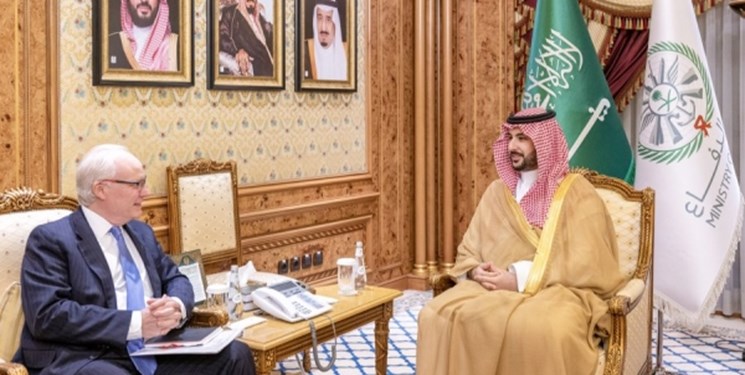The indicators of Saudi Arabia’s response to American desires to continue circumventing the demands of the Yemeni people and their legitimate entitlements are constantly escalating. The Saudi regime’s media and its activists have returned to attempts to present the Kingdom as a “mediator between Yemeni parties,” which politicians consider evidence of Riyadh’s adherence to its traditional and erroneous perceptions and estimates towards Yemen.
In this context, the editor-in-chief of the Saudi newspaper “Okaz” claimed that Sana’a must engage in what he called a “Yemeni-Yemeni dialogue” to lift the suffering from citizens. This is a clear expression of adopting the stubborn American position that links the entitlements of the Yemeni people with the condition of negotiating with mercenaries.
Lenderking, the US envoy to Yemen, had renewed his confirmation of the United States’ adherence to this condition a few days ago. He claimed that negotiating with mercenaries is “the only way” to address the humanitarian crisis in Yemen and reach a comprehensive peace. This represents a clear expression of the White House’s insistence on obstructing the efforts made by Sana’a with mediators to restore the rights of Yemenis for which Saudi Arabia bears responsibility, foremost among which are employee salaries.
The requirement to negotiate with mercenaries aims to circumvent the entire peace process by turning the conflict into an internal conflict. It presents countries of aggression and their sponsors as mediators, opening up opportunities for them to continue targeting and starving the Yemeni people behind the facade of mercenaries who have no decision.
The Saudi regime had tried during past periods to present itself in the media as a “mediator between Yemeni parties” in order to mislead public opinion and evade obligations.
In response to the talk of the editor-in-chief of “Okaz,” Ali Al-Qahum, a member of Ansar Allah’s political bureau, wrote in a tweet that Saudi Arabia “launched its aggression on Yemen and announced it from Washington at a time when Yemenis were talking in Sana’a under UN sponsorship.” He added that Saudi Arabia “still looks at reality with the same old mentality that involved it in aggression,” and that this mentality “will sink it in the swamp of Yemen.” He pointed out that “there are those who push the Saudi regime towards the abyss,” referring to the United States of America.
The leader of the revolution, Sayyid Abdul-Malik Badr al-Din al-Houthi, had recently confirmed that Saudi Arabia and the UAE are fully subject to American and British desires, despite their awareness of the cost of continuing aggression and siege. He indicated that continuing to implement Western orientations will not be in their interest, and that the Kingdom’s economy will not be safe in light of the suffering of the Yemeni people.
In response to American orientations rejecting peace, Saudi Arabia’s promotion of the condition of “Yemeni dialogue” is not the only indicator of Riyadh’s commitment to the White House’s position. Saudi media outlets, such as Al-Sharq Al-Awsat newspaper, continue to launch propaganda campaigns aimed at holding Sana’a responsible for the humanitarian crisis and salary cuts. These outlets spread rumors intended to incite clashes between employees and the national authority, in a clear attempt to blackmail Sana’a into accepting continued looting. The Yemeni people demand that the proceeds of their national wealth be liberated from Saudi Arabia’s grip and allocated for salaries and services.
These campaigns clearly express Riyadh’s insistence on adhering to American dictates by circumventing Yemeni people’s demands. National leadership has clearly warned that this will have dire consequences for the Saudi regime.
In confirmation of the impossibility of achieving Saudi Arabia’s goals in evading its responsibilities and obligations, Al-Qahum confirmed that it is necessary for Riyadh “to change its hostile orientations towards Yemen, lift its guardianship, leave interventions in internal affairs for Yemenis.”
Sana’a constantly confirms that dialogue between Yemeni parties must come after ending all forms of foreign intervention, including aggression, siege, and occupation; which Saudi Arabia and America are trying to jump over.







